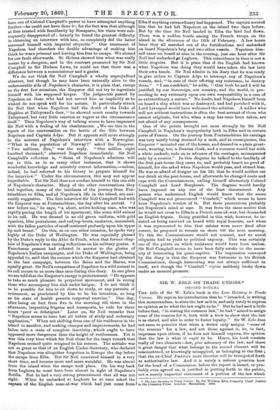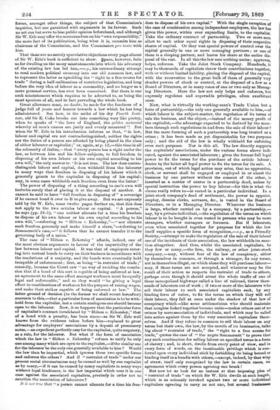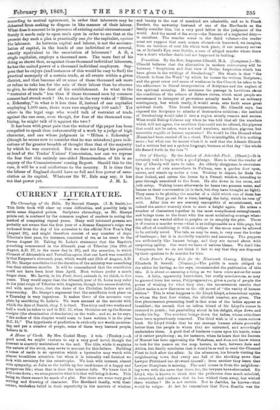SIR W. ERLE ON TRADE UNIONS.*
[SECOND NOTICE.] THE title of Sir IV. Erie's book is the Law Relating to Trade Unions. He says in his introduction that he "intended, in writing this memorandum, to state the law as it is, and only rarely to express an opinion as to what the law ought to be." But he had maid a little before that, "in stating the common law," he had "aimed to assign some of the reasons for it, both with a view to show that the law is as stated, and also in order to foster loyalty." Sir W. Erie does not seem to perceive that when a writer only assigns "some of the reasons" for a law, and not those against it, he, in fact, impresses upon others, if be does not himself express, the opinion that the law is what it ought to be. Hence, his book consisto really of two elements—law, plus advocacy of the law, and there is great danger that what belongs to the second element will be misconstrued, or knowingly misapplied, as belonging to the first ; that the ex-Chief Justice's mere theories will be trumpeted forth as authoritative law. And it is surely a serious question how far the head of a Commission, before the report is issued, or probably even agreed on, is justified in putting forth to the public, not a merely impartial statement of a portion of the law which forms, amongst other things, the subject of that Commission's inquiries, but one garnished with arguments in its favour. Such an act can but serve to bias public opinion beforehand, and although Sir W. Erie may offer the memorandum on his "own responsibility," the mere fact of its publication, being what it is, commits him as chairman of the Commission, and the Commiabion pro tunto with him.
That these are no merely speculative objections every page almost of Sir W. Erie's book is sufficient to show. §pace, however, fails us for dwelling on the many misstatements into which his advocacy of the existing law has led him,--e.g., his extraordinary attempt to read modern political economy into our old common law, and to represent the latter as upholding the" right to a free course for trade" during a hall-millennium of restrictive legislation, and long before the very idea of labour as a commodity, and no longer as a mere personal service, has ever been conceived. But there is one such misstatement which requires to be adverted to, as being the most specious of all, and in fact pervading the whole book.
Great allowance must, no doubt, be made for the fondness of a judge full of years and honour towards a law which he has long administered. See how, in the midst of his dry Fourth Institute, old Sir E. Coke breaks out into something very like poetry, when be speaks of "the laws of England, the golden nzetwand whereby all men's causes are justly and evenly measured "! But when Sir W. Erie in his introduction informs us that, "in law, labour and capital are not contradistinguilffied, neither the rights nor the duties of a person are affected by being placed in the class of either labourer or capitalist ;" or, again, at p. 12,—this time in all the solemnity of italics,—that "every person has a right under the law, as between him and his fellow-subjects, to full freedom in disposing of his own labour or his own capital according to his own will," the only answer is: It is not true. The law does contradistinguish labour and capital, does withhold from the labourer in many ways that freedom in disposing of his labour which it generally grants to the capitalist in disposing of his capital; nay, in some cases withholds such freedom even from the latter.'
The power of disposing of a thing according to one's own will includes surely that of placing it at the disposal of another. A cannot be said to have "full freedom in disposing of" a sovereign if he cannot hand it over to B to give away. But we are expressly told by Sir W. Erie, some twelve pages further on, that this does not apply to the two articles labour or capital. "A person," he says (pp. 24-5), "can neither alienate for a time his freedom to dispose of his own labour or his own capital according to his own will,"—referring to "Hilton v. Eckersley,"—" nor alienate such freedom generally and make himself a alave,"—referring to Sommersett's case,—" it follows that he cannot transfer it to the governing body of a union."
The case of "Hilton v. Eckersley " affords, indeed, one of the most obvious arguments in favour of the impartiality of the law between labour and capital. It was that of employers entering into mutual bonds to carry on their business in accordance with the resolutions of a majority, and the bonds were eventually held incapable of enforcement ; first, as being "in restraint of trade ;" secondly, because the Court saw "no way of avoiding the conclusion that if a bond of this sort is capable of being enforced at law, an agreement to the same effect amongst workmen must be equally legal and enforceable," and so they would "be giving a legal effect to combinations of workmen for the purpose of raising wages, and make their strikes capable of being enforced at law." The latter ground of decision (to the former we shall revert hereafter) amounts to this,—that a particular form of association is to be withheld from the capitalist, lest a certain analogous one should become open to the labourer. Now, it so happens that the particular form of capitalist's contract invalidated by "Hilton v. Eckersley," that of a bond with a penalty, has been since—as Sir W. Erie well knows from the evidence taken before him—replaced to great advantage for employers' associations by a deposit of promissory notes,—an expedient perfectly easy for the capitalist, quite nugatory, as a rule, for the labourer. But what if the form of association which the law in "Hilton v. E.ckersley " refuses to ratify be only cue among mauy which are open to the capitalist,—if the similar one for the labourer be the only one generally available to him ? Would the law then be impartial, which ignores these two specific forms and enforces the others ? And if "restraint of trade" under our present social circumstances may be caused as well by one capitalist as by many,—if it can be caused by many capitalists in many ways without legal hindrance, is the law impartial which uses it in one case against the associated capitalists, precisely in order not to sanction the association of labourers?
It 1.3 not true that "a person cannot alienate for a time his free
dom to dispose of his own capital." With the single exception of the case of combination among independent employers, the law has given this power, within ever expanding limits, to the capitalist. Take the ordinary contract of partnership. Two or more men allow to each other equal rights in disposing of their respective shares of capital. Or they vest special powers of control over the capital generally in one or more managing partners ; or one of them is a sleeping partner, and leaves his share at the entire disposal of the rest. In all this the law sees nothing amiss ; approves, helps, enforces. Take the Joint Stock Company. Hundreds, it may be thousands, of capitalists throw their contributions together, with or without limited liability, placing the disposal of the capital, with the reservation to the great bulk of them of generally very slender powers of cheek or control, at the disposal of a few as a Board of Directors, or in many cases of one or two only as Managing Directors. Here the law not only helps and enforces, but expressly regulates and superadds privileges, often exorbitant ones.
Now, what is virtually the working-man's Trade Union but a form of partnership,—the only one generally available to him,—of which labour is the subject-matter, the regulation of its terms of sale the business, and the object,—instead of the money profit of the capitalist,—the advantage expected to be derived by the members through such regulations in and from the sale of their labour? But the mere forming of such a partnership was long treated as a crime ; it has been made as yet dispunishable for two purposes only ; and the aid of the law is wholly withheld for enforcing even such purposes. Nor is this all. The law directly supports the capitalists' associations, under the various forms above indicated, against the associated labourers ; gives the former full legal power to fix the terms for the purchase of the article labour; denies to the latter all legal power to fix the terms for its sale. A provision, out of which legal action may arise, that no apprentice, clerk, or servant shall be engaged or employed in or about the business by one partner without the consent of the other, is inserted as a matter of course in a partnership deed, unless by special instruction the power to buy labour—for this is what the clause really refers to—is vested in a particular individual. In a joint-stock company's deed of settlement, the power to appoint, employ, dismiss clerks, servants, Ike., is vested in the Board of Directors, or in a Managing Director. Wherever the business is large, whether carried on by a company, by a partnership,— nay, by a private individual,—the regulation of the terms on which labour is to be bought is even vested in persons who may be mere strangers, whether managers or foremen. But if labourers, even when associated together for purposes for which the law itself supplies a specific form of rec,ognition,—e.g., as a Friendly Society,—attempt to make the regulation of the sale of their labour one of the incidents of their association, the law withholds its sanction altogether. And thus, whilst the associated capitalists, be they few or many,—the firm, the railway, or other joint-stock company,—may, without fear of the law of conspiracy, either by themselves in common, or through a stranger, fix any terms, not in themselves illegal, on which alone they will purchase labour— may, if those terms are not accepted, and whatever may be the result of their action as respects the restraint of trade to others, perhaps even though it should arrest the whole traffic of one of those monopolized highways called a line of railroad, throw thousands of labourers out of work ; if two or more of the labourers who sell their labour to such associated capitalists seek, by any binding form of union, to fix the terms on which they will sell their labour, they fall at once under the shadow of that law of conspiracy which—like some arithmetician who should maintain that noughts linked together become units—makes crimes out of no crimes by were association of individuals, and which may be called into action against them by the very associated capitalists themselves. And if they refuse in common to sell their labour on any terms but their own, the law, by the mouth of in luminaries, talks big about "restraint of trade," the "right to a free course for trade," quotes the case of "the negro Sommersett " to prove that any such combination for selling labour on specified terms is a form of alaiery ; and, in short, dwells from every point of view, and in every form of words, on the inestimable privilege which is conferred upon every individual stick by forbidding its being bound or binding itself in a bundle with others,—except, indeed, by that wisp of straw, itself only recognized by the law in certain cases, an agreement which every person agreeing can break !
But now let us look for an instant at that imposing plea of "restraint of trade" on which Sir W. Erie dwells at such length. which is so solemnly invoked against two or more individual capitalists agreeing to carry on not one, but several businesses
according to mutual agreement, in order that labourers may be debarred from seeking to dispose in like manner of their labour. What does it amount to in presence of existing social circumstances? Sarely it needs only to open one's eyes in order to see that at the present day such a plea is practically one for the capitalist, against the labourer. As between capital and labour, is not the accumulation of capital, in the hands of one individual or of several, exactly equivalent to the association of labourers? A B, a single capitalist, employs a thousand men. The mere fact of his doing so shows that, as against those thousand individual labourers, he has the united power of a thousand individual employers. Suppose that he enjoys (and instances of this would be easy to find) the practical monopoly of a certain trade, at all events within a given district, and that because all or some of those thousand ask more or refuse to take less for the sale of their labour than he chooses to give, he shuts the door of his establishment. In what is the 4' restraint of trade" less than if those thousand men by common consent had struck work ? Or, to steer in the very wake of "Hilton v. Eckersley," in what is it less than if, instead of one capitalist employing 1,000 men, there were two employing 500 each ? Yet where is the legal sage who would talk of restraint of trade against the one man, even though, for fear of the thousand combining, he might talk of it against the two ?
It has been with great pain that the writer of this paper has been compelled to speak thus unfavourably of a work by a judge of high character, and one whose judgment in "Hilton v. Eckersley " (though he seems now to consider that he was mistaken) gave indications of far greater breadth of thought than that of the majority by which he was overruled. But we dare not forget his position as head of the Trades' Unions' Commission, nor can we repress the fear that this entirely one-sided Memorandumof his is an augury of the Commissioners' coming Report. Should this be the case, it will be a real misfortune to the country. It is time that the labour of England should have as full and free power of association as its capital. Whatever Sir W. Erie may say, it has not that power yet. J. M. L.




































 Previous page
Previous page